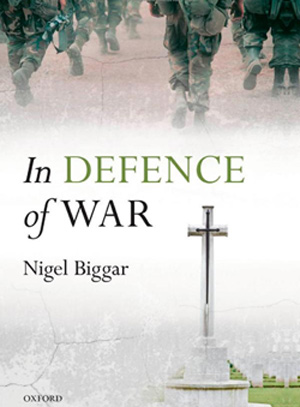Is war ever morally justified?
A new book revives the debate over just war theory


Anyone who cares about questions of war and peace — and who wishes to think deeply about how to assess those questions morally — should buy and promptly read Nigel Biggar's In Defense of War. Over the past few decades, many authors have written articles and books attempting to construct an apparatus for judging the morality of war. I know of none that approaches Biggar's book in lucidity and thoroughness. Readers who absorb and apply Biggar's criteria for assessing wars will have a clear and cogent way of judging whether past or future wars deserve to be considered just or unjust — by which Biggar means morally justified or unjustified. That's one reason why Biggar's book deserves a wide and responsive readership.
Here is another: Precisely by doing his job so thoroughly and elegantly, Biggar inadvertently demonstrates more fully than any previous author that just war thinking, even at its very best, is an intellectual, moral, and theological fraud.
Okay, it's not completely fraudulent. The attempt to establish criteria for judging conduct within a war that's already been declared (ius in bello) has had a morally salutary influence on how the U.S. military, for example, conducts itself in battle. The Pentagon now works very hard to ensure that, in any given mission, our military uses no more force than is necessary to vindicate the cause and that it refrains from intentionally killing civilians. That we now expect our armed forces to abide by these rules of war — and judge other states severely when their soldiers fail to do the same — is unquestioningly a good thing. And it's a development to which we owe a debt of gratitude to those who have worked to revive just war thinking, adapting its premodern moral calculus for the age of total war.
Subscribe to The Week
Escape your echo chamber. Get the facts behind the news, plus analysis from multiple perspectives.

Sign up for The Week's Free Newsletters
From our morning news briefing to a weekly Good News Newsletter, get the best of The Week delivered directly to your inbox.
From our morning news briefing to a weekly Good News Newsletter, get the best of The Week delivered directly to your inbox.
But that's not where most of the intellectual action is found among those seeking to rehabilitate just war thinking today. That action is focused on the criteria for determining when it's just to go to war in the first place (ius ad bellum). This is certainly what Biggar, a professor of moral and pastoral theology at Christ Church, Oxford, cares about. And it is what makes just war thinking so very appealing to foreign policy hawks of various stripes — neoconservatives, liberal interventionists, and realists who define American national interests very broadly.
This is also what makes just war thinking a scam. To see why, consider the six criteria just war theorists, including Biggar, use to determine when a war is morally justified. The war must be undertaken with the intention of establishing a just peace. It must be defensive. It must be aimed at protecting the innocent against unjust aggression. It must have a reasonable chance of success. It must be declared and waged by a competent governing authority. And it must be undertaken as a last resort. If the war meets these six criteria, it can be considered morally justified.
Let's leave aside the question of whether such a judgment should be considered Christian. (I will examine that in a subsequent column.) Here I'm mainly interested in a narrower issue: Is there any realistic scenario in which, judged by these criteria, the 21st-century United States would start and wage a war that it didn't consider just?
I submit that the answer is an unequivocal no. We always have a moral rationale for undertaking military action. We always consider our actions defensive (even if the aggression hasn't happened yet) and aimed at protecting the innocent. We always think we have a reasonable chance of success. We always consider ourselves to be a competent authority. And we always claim to have waited as long as possible to act.
If Americans were the rapacious marauders Noam Chomsky claims we are — if, for example, we were contemplating an invasion of Canada to annex the tar sands oil fields for our own use — then ad bellum criteria might be a useful means of rendering judgment of our actions, reining them in, and directing them toward more moral ends. (Maybe Biggar's publisher should send a gratis copy of his book to Vladimir Putin.) But of course the United States doesn't behave that way. We're inclined to start or join wars (lots and lots of them) for the loftiest of reasons. Given this fact, ad bellum considerations primarily provide an additional moral and theological imprimatur for actions we would be inclined to do anyway.

The U.S.'s default setting is to careen toward conflict, but Biggar believes it's necessary to step harder on the gas because he fears that a "presumption against war" has taken hold in the Western world. (Reading his book, you'd think that the foreign policy establishments of the U.S. and U.K. were dominated by pacifists.) In Biggar's view, this presumption focuses too single-mindedly on the "terrible evils" wrought by war while downplaying the fact that not going to war permits evils of its own.
True enough: evil arises from both acts of commission and acts of omission.
There are just two problems.
First, as I've argued before, states have different moral obligations than individuals. When an individual refuses to come to the aid of a victim of injustice, we rightly judge him harshly for failing to fulfill his moral duty. But the primary and overriding duty of a government is to uphold the nation's common good and defend its citizens against external harm or attack. If that sounds selfish, that's because it is. Our government's highest duty is to us. It can have no duty to the citizens of another nation.
Second, to insist that policymakers base the decision about whether to go to war on the supposition that a failure to act will result in worse moral atrocities than if they do act is to place a black box of uncertainty at the core of deliberation. And that can lead to massive blunders, as we saw very vividly in the arguments leading up to the start of the Iraq War in 2003 — arguments that Biggar exhaustively reconstructs in an unfortunate 69-page chapter that ends with him pronouncing that, all things considered, the war was morally justified.
I'm going to go out on a limb here and simply declare that any moral calculus that gives such a result is effectively worthless. One would think that at this late date it would be unnecessary to list the reasons why. But apparently not. Here, then, are merely a few, using Biggar's own just war criteria as a method of evaluation.
1. There was no atrocity underway in Iraq during the spring of 2003, and so there were no innocents to protect from unjust aggression. (Unless, of course, we expand the term "atrocity" to include the injustices endured by everyone living under a tyrant, in which case the list of just wars would be very long indeed.)
2. As Saddam Hussein's actions during the 1991 Gulf War made clear, he was deterrable. (The fact that after the 2003 invasion he was found to possess no weapons of mass destruction provides further, retrospective justification of this view.) This means that war was not undertaken as a last resort.
3. The fact that he was deterrable and possessed no weapons of mass destruction means that he posed no significant threat to us or our allies. This means that the war was not defensive.
4. Estimates of violent deaths in Iraq as a direct or indirect result of the invasion and occupation of the country range from just over 100,000 to more than 1 million. Those deaths continue, by the way, right down to the present. Even if we side with the lower estimates and assume roughly 100,000 civilian deaths, there is no plausible scenario in which anywhere close to that number of people would have been killed if we had left Saddam Hussein in power. So much for evils of omission.
A final consideration. Americans sometimes worry about the risks and costs involved in the United States acting as the world's policeman. But what advocates of just war reasoning have in mind is far more sweeping. They would empower the U.S. (along with the U.K. and any other nation willing to pitch in — remember the "coalition of the willing"?) to serve as nothing less than the world's moral judge, jury, and executioner, meting out punishment for transgressions of justice. (Read Biggar on how war can and should have a "punitive" dimension.)
This is an extremely bad idea. Americans are already too inclined to believe in their own righteousness. Their tendency toward what Alexis de Tocqueville called "the perpetual utterance of self-applause" often leads them to make foolish mistakes. They certainly don't need theologians telling them that their good intentions entitle them, over the inevitable objections of billions of their would-be subjects, to appoint themselves the world's benevolent despot.
Nothing good can come of that.
In a future column, I will examine the religious sources of just war thinking and ask whether it deserves to be considered Christian at all.
A free daily email with the biggest news stories of the day – and the best features from TheWeek.com
Damon Linker is a senior correspondent at TheWeek.com. He is also a former contributing editor at The New Republic and the author of The Theocons and The Religious Test.
-
 Social Security: Insolvency date keeps getting closer
Social Security: Insolvency date keeps getting closerFeature A new report has projected that Social Security funds could be depleted by 2033
-
 Are AI lovers replacing humans?
Are AI lovers replacing humans?Talking Points A third of Gen Z singles use tech as a 'romantic companion'
-
 What are the Trump Accounts for kids and how do they work?
What are the Trump Accounts for kids and how do they work?The Explainer Parents will soon be able to open tax-advantaged investment accounts on their child's behalf
-
 The last words and final moments of 40 presidents
The last words and final moments of 40 presidentsThe Explainer Some are eloquent quotes worthy of the holders of the highest office in the nation, and others... aren't
-
 The JFK files: the truth at last?
The JFK files: the truth at last?In The Spotlight More than 64,000 previously classified documents relating the 1963 assassination of John F. Kennedy have been released by the Trump administration
-
 'Seriously, not literally': how should the world take Donald Trump?
'Seriously, not literally': how should the world take Donald Trump?Today's big question White House rhetoric and reality look likely to become increasingly blurred
-
 Will Trump's 'madman' strategy pay off?
Will Trump's 'madman' strategy pay off?Today's Big Question Incoming US president likes to seem unpredictable but, this time round, world leaders could be wise to his playbook
-
 Democrats vs. Republicans: which party are the billionaires backing?
Democrats vs. Republicans: which party are the billionaires backing?The Explainer Younger tech titans join 'boys' club throwing money and support' behind President Trump, while older plutocrats quietly rebuke new administration
-
 US election: where things stand with one week to go
US election: where things stand with one week to goThe Explainer Harris' lead in the polls has been narrowing in Trump's favour, but her campaign remains 'cautiously optimistic'
-
 Is Trump okay?
Is Trump okay?Today's Big Question Former president's mental fitness and alleged cognitive decline firmly back in the spotlight after 'bizarre' town hall event
-
 The life and times of Kamala Harris
The life and times of Kamala HarrisThe Explainer The vice-president is narrowly leading the race to become the next US president. How did she get to where she is now?
